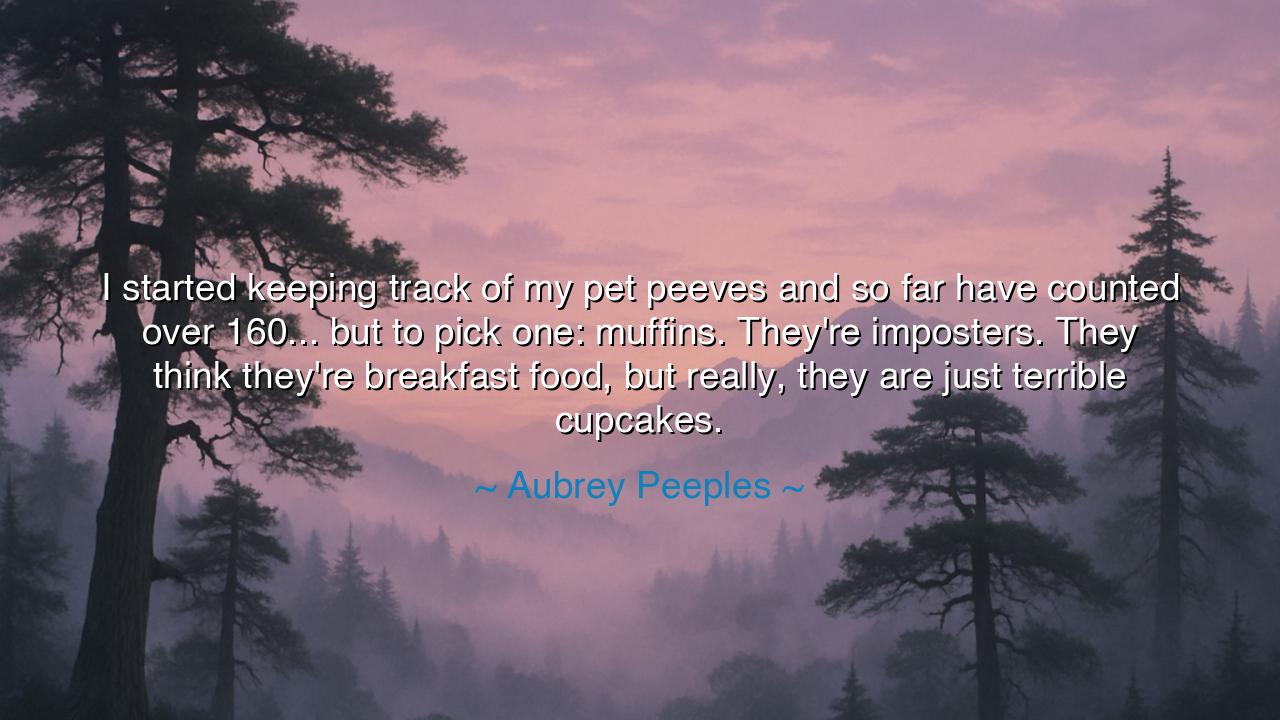
I started keeping track of my pet peeves and so far have counted
I started keeping track of my pet peeves and so far have counted over 160... but to pick one: muffins. They're imposters. They think they're breakfast food, but really, they are just terrible cupcakes.






Hear, O seekers of truth hidden within jest, the words of Aubrey Peeples, who confessed with sharp wit: “I started keeping track of my pet peeves and so far have counted over 160... but to pick one: muffins. They're imposters. They think they're breakfast food, but really, they are just terrible cupcakes.” At first, these words provoke laughter, for they speak of a common food with uncommon disdain. Yet beneath their humor lies wisdom: a reflection on deception, on appearances versus reality, and on the need to look past the labels we are given to see the essence of things.
The ancients often warned against false appearances. Plato told of the shadows upon the wall of the cave, illusions mistaken for truth. So too does Peeples, in her own playful way, call the muffin a shadow of the cupcake—pretending to belong to the realm of wholesome nourishment, yet in truth being but a sweet dressed in disguise. Her jest reminds us that the world is filled with imposters: things, ideas, and even people who present themselves as virtuous when in truth they are but weakened forms of something else.
Consider the story of Diogenes the Cynic, who mocked the pretenses of society. When he saw men parading with wealth and false virtue, he exposed them with biting humor, carrying his lantern in daylight “looking for an honest man.” Peeples, in her mockery of the muffin, carries the same lantern, shining it upon the absurdity of a pastry that claims to be breakfast yet lacks the delight of a true dessert. Through laughter, she urges us to examine not only muffins but all imposters in life—the practices, habits, and roles that wear false titles.
Yet her words also touch upon the human tendency to accept labels without question. We call the muffin “breakfast,” and so it becomes acceptable at dawn, while the “cupcake” is reserved for celebration. But when the wrapper is peeled away, are they not kin, differing only in frosting? This reveals a broader truth: society often shapes our perception more than reality itself. To see clearly is to look beyond names and traditions, to judge things by their nature rather than by their mask.
In her counting of pet peeves, Peeples also shows us the discipline of awareness. She names what irritates her, not to drown in negativity, but to shine light on the small absurdities of life. In this practice lies wisdom: by naming what disturbs us, we disarm it. By laughing at imposters, we free ourselves from their hold. In mocking the muffin, she teaches us that humor is a shield against the small deceptions and frustrations that otherwise weigh down the heart.
The lesson, therefore, is this: do not be deceived by appearances. Whether in food, in speech, or in life, seek the truth beneath the surface. Question what is presented to you, even if it seems harmless. If a thing claims to be noble, test its essence. If a habit claims to be healthy, measure its fruit. Let humor guide you, as Peeples guides us, for laughter is the gentlest sword against falsehood.
Practically, this means living with discernment. Do not take things at face value; ask what lies beneath. Laugh at the small absurdities, but also recognize their greater echoes in life. Train your eyes to see imposters, whether in muffins, in promises, or in people. And when you find them, do not be bitter—be clear-eyed, be light-hearted, and walk toward the truth.
So let these words endure: Beware the muffin, the imposter of the morning. For it is not only about pastries, but about all that pretends to be what it is not. By seeing through such disguises, by naming them with honesty and laughter, we live more freely, more wisely, and more joyfully.






AAdministratorAdministrator
Welcome, honored guests. Please leave a comment, we will respond soon